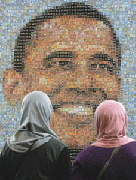On the same day that Rep. Peter King held the fourth “homegrown terrorism” hearing focused exclusively on Muslims, the White House released its Strategic Implementation Plan for Empowering Local Partners to Prevent Violent Extremism in the United States. Despite the White House’s seemingly benign approach to counterterrorism, its implementation produces adverse effects similar to Mr. King’s confrontational tactics.

The White House Strategy proclaims, “Law enforcement and government officials for decades have understood the critical importance of building relationships, based on trust, with the communities they serve. Partnerships are vital to address a range of challenges and must have as their foundation a genuine commitment on the part of law enforcement and government to address community needs and concerns, including protecting rights and public safety.”
To someone unfamiliar with the history of community outreach to American Muslims, the strategy sounds ideal. However, the Obama administration has sabotaged its own high-minded public position by adopting the Bush administration’s counterterrorism model that punishes the broad Muslim community rather than targeting genuine threats. Thus, the administration’s actual practices conform all-too-closely to Peter King’s vision of terrorism being synonymous with Islam.
While preventing terrorism before it happens is a legitimate strategy, the way in which it is currently implemented comes at a high price to a vulnerable minority — Muslims in America.
Expansive surveillance laws coupled with a relaxation of terrorism investigative standards have placed mosques under intrusive surveillance. Similarly, thousands of informants have been hired, for hefty payments, to induce inept and often mentally ill young Muslim men to join fake terrorist plots. Watch lists are bulging with Muslim names while those incorrectly listed lack due process rights to seek removal of their names. Scores of Muslims with no ties to terrorism are charged for making false statements to federal agents in retaliation for refusing to serve as informants. And attempts to locate “lone wolf terrorists” have resulted in the misguided conflation of Muslim orthodox practices with terrorism.
These assaults on Muslims’ civil liberties have strained relations between Muslim communities and law enforcement agencies.
Community outreach meetings, in theory, are supposed to provide the communities with an opportunity to work with government to keep counterterrorism efforts from violating civil rights and civil liberties. Unfortunately, officials routinely dismiss community grievances, reciting self-congratulatory boilerplate that the American government respects constitutional rights as it fights terrorism. Indeed, the government’s cavalier disregard of community concerns is so pervasive that many leaders have concluded that meetings with federal officials are merely pro forma, check-the-box events providing political cover to a government they believe is systematically and unlawfully profiling Muslims. Others have chosen to boycott the meetings altogether.
The government seems oblivious to the harm these counter-terrorism policies are doing to the potential for trust in Muslim communities. Making matters worse, the immense political pressure on the Justice Department to produce terrorism indictments, and congressional accusations that Obama is soft on terrorists, places the Muslim communities in an intractable dilemma: How can you be partners with agencies who misdirect adversarial behavior from actual terrorists to Muslim communities en masse?
If a young Muslim terrorist suspect manipulated into a phony plot has mental health problems and needs rehabilitative health services, for example, investigators and prosecutors nonetheless pursue the adversarial route — to prosecute and incarcerate. The combined effects of these entrapment efforts and over-charging obviously disturbed young Muslim men threatens to devastate Muslim communities in the same way that the mass incarceration of African American men has transformed the communities from which they have been removed.
Such concerns are validated by documents obtained through a freedom of information request by the American Civil Liberties Union, proving the FBI used community outreach meetings for collecting intelligence on American Muslims. According to the ACLU, the FBI did not inform Muslims at outreach events, such as community meetings, religious dinners and job fairs, that conversations and names of those in attendance would be recorded in government files. A 2008 document shows that an FBI agent “collected and documented individuals’ contact information and First Amendment-protected opinions and associations, and conducted Internet searches to obtain further information about the individuals in attendance.” This may explain why individuals, including imams, who were active participants in government outreach programs, have found themselves indicted or deported, sending a chill through Muslim communities.
If the government is serious about partnering with Muslim communities, it must stop behaving like an adversary. For starters, community outreach programs should not be exploited to spy on Muslims, recruit undercover informants, and make false promises.
Until the administration translates its lofty rhetoric into tangible policy reforms, there will not be much difference between Mr. King’s and President Obama’s approaches to counterterrorism.
Sahar Aziz is an associate professor of law at Texas Wesleyan University School of Law and a fellow at the Institute for Social Policy and Understanding. She is the author of Caught in a Preventive Dragnet: Selective Counterterrorism Against Muslims, Arabs, and South Asians forthcoming in the Gonzaga Law Review. Reprinted from the Huffington Post.






Leave a Reply